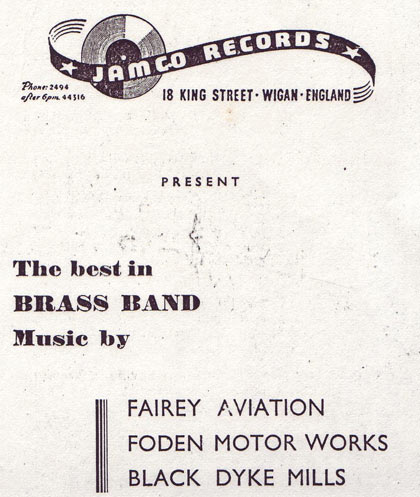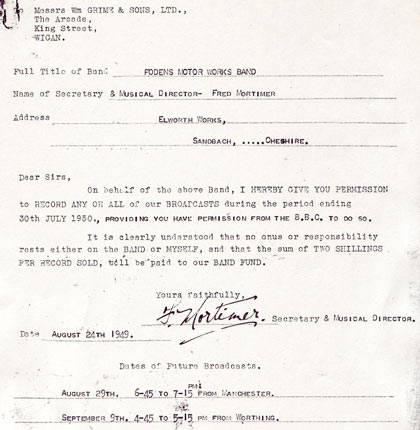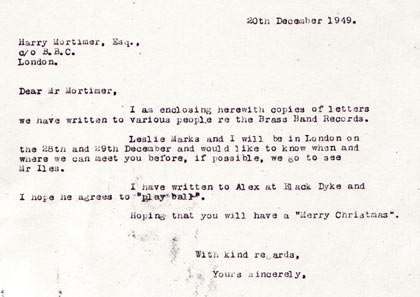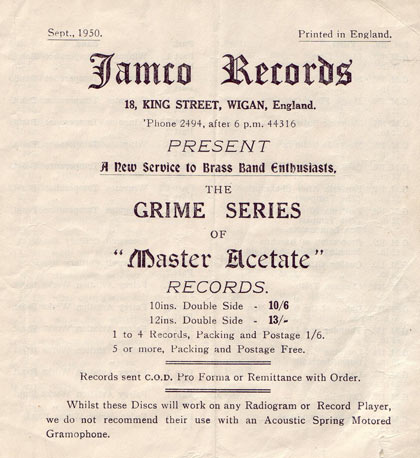4BR Time Team - April 2008
1-Apr-2008This month we delve into the history books to find out about the brass band recording scene of 1949, and the entrepreneurial skills of a certain William Gaskell of Jamco Records.
There was a time, many years ago it must be said, when getting your band to record their talents for posterity wasn’t as easy as it is now.
Today all a band has to do is pick up the phone and there are a host of potential recording companies more than willing to meet your very specific requirements.
Jamco Recordings

Advertising their wares: Jamco Recordings present...
60 years ago it was a bit different, and 4BR has been very fortunate to have been given a fantastic glimpse of how bands, just after the Second World War, had the chance to be recorded for posterity through the quite remarkable entrepreneurial skills of one company in particular.
Brass band historian Allan Littlemore has a veritable cornucopia of banding treasures in his possession and he has given 4BR a whole batch of correspondence from 1949, when a company called William Grimes & Sons of King Street, Wigan, went about drumming up custom for their in house recording label called ‘Jamco Records’.
The company advertised itself as ‘Radio and Piano Dealers’ based at ‘The Arcade’, King Street in Wigan – not perhaps the most auspicious address in recording history maybe, but a handy base nonetheless for its operation.
Brass Band Record Department
That operation was headed by William Gaskell, erstwhile secretary of the Wingates Band, of the company’s grandly named ‘Brass Band Record Department’, and it seems they had come up with the very handy selling tool to brass bands that they could in fact record any BBC brass band broadcast that the bands were undertaking at the time for radio as long as they had permission from the band in question that they could do so.
With permission also granted by Lord Reith and the BBC ‘Authorities’ as they were called, the company would then produce either a 12”, 10”, 8”, 6” or 5” pressed record of the broadcast in question either at their own recording studio (open every day 9.00am – 6.00pm, except Wednesdays) or with their ‘mobile’ equipment, which they stated in their promotional leaflet, was, “…at your disposal at any time of the day or evening, including Sundays.’ In addition the company also provided, ‘…a very good piano, bass drum and kit for your use.”
As for the cost?
Well they didn’t miss a trick on that too. Your band could order from a single copy priced at 25/- (that’s 25 shillings or £1.25 in new money) or up to 12 copies or more at 17/-. If a band ordered over 73 records to sell then the double sided 12” and 10” recordings (not suitable for use on a spring type motored gramophone) cost between 7/- and 9/-.
The smaller record sizes were cheaper (the 5” records were priced between 2/6 and 2/3), whilst the royalty fee ranged from 6d to 1/- per record.
Delivery took between 21 and 28 days and if you had any problems you could contact Grime & Sons by telephone on Wigan 2494 (44316 after 6.00pm).
Leading bands
A number of the leading bands of the day were in fact persuaded to take up the offer and following correspondence to the appropriate Band Managers and Secretary’s during August and September 1949, a whole host of top bands signed up.
Amazingly the correspondence still survives and makes for fascinating reading to how the company and its intrepid head of its brass band record department went about drumming up business for itself.
Mr Gaskell sent out an introductory leaflet to the bands outlining the terms and conditions of the recordings, plus a template return response that had to be completed to give permission for the broadcast recording to be recorded by Jamco.
Rather craftily he even sent one to his own address in his Wingates capacity that he signed for himself to give permission on behalf of the band!
Signed up

Just ask Fred: Fred Mortimer signs Fodens up for the 2 shilling deal...
The likes of Barrow Shipyard, Black Dyke Mills, Cory Workman’s Silver, Creswell Colliery, CWS (Manchester), Edge Hill British Railways, Fairey Aviation Works, Fodens Motor Works, Grimethorpe Colliery Institute, Horwich, Ransome & Marles Works, Wingates Temperance and the Yorkshire Copper Works Bands all signed up.
In doing so they had to list their forthcoming broadcasts and in return for agreeing to Jamco recording the bands in the period up to and including 30th July 1950 the band would receive the princely sum of two shillings per record sold which was to be paid into the each bands ‘Band Fund’.
And so the likes of Joe Wood at Black Dyke, Bryn Evans at Cory, Fred Roberts at CWS (Manchester), W J Hume at Fairey and one Fred Mortimer at Fodens, signed on the dotted line and gave details of their next broadcast dates, and in some cases, even the music they were due to play.
Grimethorpe for instance noted that their next recording was to be for the North of England Home Service on 5th September 1949 on which they would play ‘Mirabella’, ‘Selveig’s Song’, ‘Carmen Selection’ and ‘Rose Marie’.
CWS (Manchester) meanwhile noted a broadcast on 2nd September 1949 that included ‘The Mill on the Cliff’, Harry Cooke playing the trombone solo, ‘Panis Angelicus’, ‘Rhapsody on Negro Spirituals and tunes from ‘Chu, Chin, Chow’.
Flattery
Flattery was not out of the question too as Gaskell sought to get the best bands of the time on board.
Wanting the Fairey Aviation Works Band to sign up as they were the current British Open Champion, Gaskell had added his congratulations on their Belle Vue success in a letter written just a week after their triumph in September 1949.
The Honourable Band Manager, William Hume wrote back, thanking him on his timely congratulations and that their next BBC Broadcast of the 20th September would in fact include the Belle Vue Test Piece ‘Rhapsody in Brass’. Crafty isn’t the word to describe him is it now?
Now that Grimes had got the top bands on board he sought to expand their market and received acceptance from R. Smith & Co that they would like to see a list of their ‘gramophone records’ so that they could recommend them to bandsmen in Australia and other countries.
John Henry Iles

Ask Alex to play ball! :Gaskill's letter to Harry Mortimer
Gaskell even wrote to the great John Henry Iles at 210, The Strand, London asking if he and a Leslie Marks could see him whilst they were in the capital: “…we would esteem it a favour if you could grant us an interview on Wednesday between 10 and 12, so that we could have a discussion on the future of records,” Gaskell rather gushed in his letter of the 20th December 1949.
So too to Arthur Mackler, Editor of the grandly named ‘Musical Mail & Progress’ in which Gaskell rather cheekily named dropped to impress. “We are the company Mr Harry Mortimer told you about… and we would very much like to meet you with a view to explaining the objects and aims of this recording of brass bands.”
Even the great man and his siblings were not exempt from the tour de force salesmanship – even close to Christmas!
In a letter dated 20th December, Harry Mortimer was contacted by Gaskell with copies of further letters he had sent to as he stated; “…various people re the brass band records.”
Gaskell even wrote: “I have written to Alex at Black Dyke and I hope he agrees to ‘play ball’. Hoping you have a “Merry Christmas.”
Genius
It seems Gaskell was a genius at selling his wares as not only did that full list of bands sign up, but Harry, Alex and John Henry Isles seemed to find it a great idea too.
The following September 1950, a small leaflet proclaimed:
Jamco Records present: “A New Service to Brass Band Enthusiasts.”
The Grime Series of “Master Acetate” Records.
10ins. Double Side – 10/6.
12ins. Double Side – 13/-
1 -4 records, packing and postage 1/6
5 or more, packing and postage free.
“Whilst these discs will work on any radiogram or record player we do not recommend their use with an acoustic spring motored gramophone”.

The September 1950 leaflet advertising Jamco's new service
Fruits of labour
Inside, the fruits of Gaskell’s labours were revealed.
54 recordings from the likes of Wingates Temperance, Cresswell Colliery, Fairey, Fodens, Black Dyke, Cory, CWS (Manchester), Harton Colliery, Grimethorpe, Carlton Main, Ransome & Marles and even lesser known bands such as Rhyl Silver and Oldham British Legion.
The 12” and 10” records included such gems (recorded on Part 1 and Part 2 as you had to turn the record over halfway through most pieces) as ‘Lilac Time’, ‘The Legionaires’, ‘Quaker Girl Selection’, ‘Chanson Triste’, ‘Tintagel’, ‘Over the Waves’, ‘Bitter Sweet Selection’, Chu, Chin Chow Selection’, Selveig’s Song’, ‘Triumph of Industry’, ‘Lorenzo’, ‘Wine, Women and Song’ and even Willie A. Lang playing ‘Trumpet Tune’.
Further booklets spoke of further releases in April and July of 1951 from Fodens, Black Dyke and Fairey such as ‘Firefly’ featuring Norman Coglan and ‘Napoli’ with Elgar Clayton, Teddy Gray playing, ‘The Redcap’, Harry Mather on ‘Robin Adair’ and John Slinger and Lance Win playing the trombone duet ‘The Troubadours’.
What became of Jamco Recordings and what became of the truly great brass band recording entrepreneur William Gaskell we know not what.
But if you think your band is getting something truly unique when it wishes to record a CD in future, then think again – someone else had thought of the idea years before…
Iwan Fox with thanks to Allan Littlemore.















